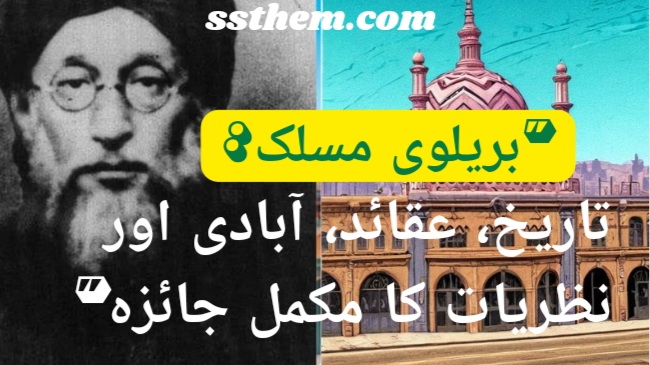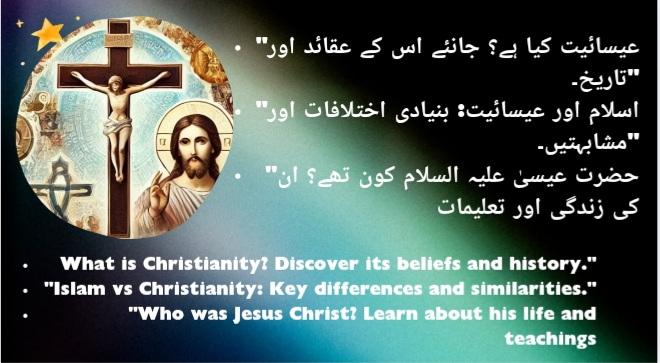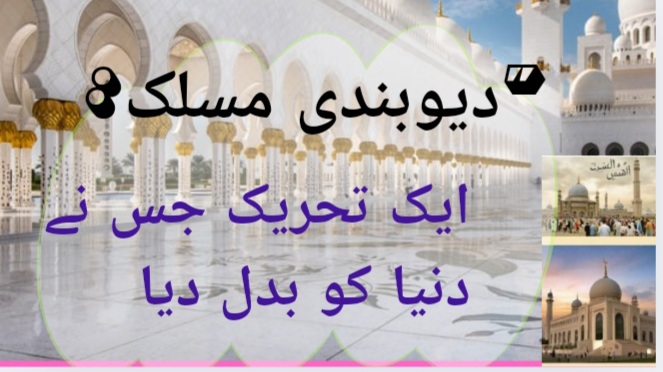بریلوی مسلک: تاریخ، عقائد، آبادی اور نظریات
بریلوی مسلک، اہل سنت والجماعت کے ذیلی مکاتب فکر میں سے ایک ہے، جس کی بنیاد برصغیر پاک و ہند میں رکھی گئی۔ یہ مکتب فکر اپنے عقائد، نظریات، اور طرز عمل کے ذریعے دنیا بھر میں مسلمانوں کے درمیان ایک اہم مقام رکھتا ہے۔ اس تحریر میں بریلوی مسلک کی تاریخ، اس کے بنیادی عقائد، موجودہ آبادی، اور اس کے نظریاتی پہلوؤں پر تفصیلی روشنی ڈالی جائے گی۔
بریلوی مسلک کی تاریخ
بریلوی مسلک کا آغاز انیسویں صدی کے اواخر میں ہوا، اور اس کے بانی اعلیٰ حضرت امام احمد رضا خان بریلوی (1856-1921) ہیں۔
- پیدائش: احمد رضا خان 14 جون 1856 کو بریلی، اتر پردیش (ہندوستان) میں پیدا ہوئے۔
- تعلیم: آپ نے قرآن، حدیث، فقہ، اور دیگر اسلامی علوم میں مہارت حاصل کی اور صرف 13 سال کی عمر میں فقہ میں فتویٰ جاری کرنے لگے۔
- تصنیفات: احمد رضا خان نے 1000 سے زائد کتابیں لکھیں، جن میں “فتاویٰ رضویہ” سب سے مشہور ہے۔
- مقصد: احمد رضا خان نے مسلمانوں کے درمیان بڑھتے ہوئے اصلاحی اور وہابی نظریات کا رد کیا اور نبی صلى الله عليه وسلم کی محبت، اولیاء اللہ کے احترام، اور صوفی تعلیمات کے فروغ کو اپنی زندگی کا مشن بنایا۔
بریلوی مسلک کے بنیادی عقائد
بریلوی مسلک کے عقائد اہل سنت والجماعت کے دیگر مکاتب فکر سے ملتے جلتے ہیں، مگر نبی صلى الله عليه وسلم کی محبت اور روحانی عقیدت کو زیادہ اہمیت دیتے ہیں۔
1. محبت رسول صلى الله عليه وسلم
- نبی صلى الله عليه وسلم کو “نور” ماننا۔
- میلاد النبی صلى الله عليه وسلم منانا اور اس کی اہمیت کو اجاگر کرنا۔
- نبی صلى الله عليه وسلم کی عظمت اور مقام کو بلند ترین سمجھنا۔
2. وسیلہ اور شفاعت
- اولیاء اللہ کو اللہ کے قریب ماننا اور ان سے دعا کے لیے وسیلہ لینا۔
- نبی صلى الله عليه وسلم اور دیگر صالحین کی شفاعت پر ایمان۔
3. تصوف اور روحانیت
- صوفی بزرگوں کے مزارات کی زیارت کرنا۔
- ذکر، دعا، اور مراقبہ کے ذریعے اللہ سے قربت حاصل کرنا۔
4. بدعت حسنہ
- نئی چیزیں جو دین کے اصولوں کے مطابق ہوں، مثلاً دینی اجتماعات اور نعت خوانی، کو قبول کرنا۔
بریلوی مسلک کے نظریاتی پہلو
بریلوی مسلک کا سب سے بڑا نظریاتی پہلو یہ ہے کہ دین میں محبت اور روحانیت کو اہم مقام دیا جائے۔
- مفاہمت کا پیغام: بریلوی مسلک دوسرے مکاتب فکر کے ساتھ رواداری اور امن کے پیغام کو فروغ دیتا ہے۔
- اصلاح بدعت: دین میں ایسی بدعتوں کا خاتمہ جو اسلامی تعلیمات کے خلاف ہوں۔
بریلوی مسلک کی آبادی
بریلوی مسلک کے ماننے والے دنیا کے مختلف حصوں میں پائے جاتے ہیں، خاص طور پر جنوبی ایشیا میں۔
- پاکستان: تقریباً 50-60% مسلمان بریلوی مسلک سے تعلق رکھتے ہیں۔
- ہندوستان: ہندوستان میں بھی بریلوی مکتب فکر کا بڑا طبقہ موجود ہے، خاص طور پر شمالی اور مغربی ہندوستان میں۔
- بنگلہ دیش: بریلوی عقائد بنگلہ دیش میں بھی مقبول ہیں، خاص طور پر دیہی علاقوں میں۔
- دنیا بھر: بریلوی مسلک کے پیروکار دنیا کے دیگر ممالک میں بھی موجود ہیں، جن میں برطانیہ، جنوبی افریقہ، اور مشرق وسطیٰ شامل ہیں۔
کل آبادی
دنیا بھر میں بریلوی مسلمانوں کی تعداد تقریباً 200-250 ملین کے قریب ہے۔
بریلوی مسلک کے اہم ادارے
بریلوی مکتب فکر سے وابستہ کئی مذہبی ادارے ہیں جو دینی تعلیمات کو عام کرنے اور اصلاحات میں اہم کردار ادا کر رہے ہیں:
- دارالعلوم منظر الاسلام، بریلی: اعلیٰ حضرت احمد رضا خان کا قائم کردہ مدرسہ۔
- دعوت اسلامی: پاکستان میں قائم ہونے والی ایک عالمی تنظیم جو بریلوی عقائد کو فروغ دیتی ہے۔
- سنی دعوت اسلامی: ہندوستان میں ایک اہم تنظیم جو بریلوی نظریات کی ترویج کرتی ہے۔
بریلوی مسلک کے تہوار اور روایات
بریلوی مسلمان دین کے کئی اہم پہلوؤں کو اپنی روزمرہ زندگی کا حصہ بناتے ہیں:
- میلاد النبی صلى الله عليه وسلم: یہ بریلوی مسلک کا سب سے اہم تہوار ہے، جو ربیع الاول کے مہینے میں منایا جاتا ہے۔
- عرس: صوفی بزرگوں کے عرس (برسی) پر مزارات پر اجتماعات اور دعائیں کی جاتی ہیں۔
- نعت خوانی: نبی صلى الله عليه وسلم کی تعریف میں نعت خوانی بریلوی مسلک کی اہم روایت ہے۔
بریلوی مسلک پر اعتراضات اور ان کے جوابات
1. بدعت کا الزام
کچھ مکاتب فکر بریلوی مسلک پر بدعات کو فروغ دینے کا الزام لگاتے ہیں۔
- جواب: بریلوی مسلک بدعت حسنہ کو جائز سمجھتا ہے، بشرطیکہ وہ قرآن و سنت کے اصولوں کے خلاف نہ ہو۔
2. اولیاء اللہ کی عقیدت
کچھ لوگ مزارات پر جانے کو شرک قرار دیتے ہیں۔
- جواب: بریلوی مکتب فکر اسے اللہ سے قربت کا ذریعہ سمجھتا ہے، نہ کہ عبادت۔
The Barelvi School of Thought: History, Population, Beliefs, and Ideology
The Barelvi school of thought is one of the prominent sub-sects within Sunni Islam, originating in the Indian subcontinent. Known for its emphasis on the love of the Prophet Muhammad (PBUH) and spiritual devotion, it holds a significant place among Muslims worldwide. This article delves into the history, core beliefs, population, and ideological aspects of the Barelvi movement.
History of the Barelvi School of Thought
The Barelvi movement began in the late 19th century, spearheaded by Imam Ahmed Raza Khan Barelvi (1856–1921).
- Birth: Ahmed Raza Khan was born on June 14, 1856, in Bareilly, Uttar Pradesh, India.
- Education: He mastered Islamic sciences, including Quran, Hadith, and Fiqh, at a young age and started issuing religious verdicts (Fatwas) at 13.
- Writings: He authored over 1,000 works, with “Fatawa Razawiyya” being the most notable.
- Mission: Ahmed Raza Khan aimed to counter reformist and Wahhabi ideologies, emphasizing love for the Prophet (PBUH), respect for saints, and the teachings of Sufism.
Core Beliefs of the Barelvi School
The Barelvi school shares fundamental Islamic beliefs but prioritizes love for the Prophet (PBUH) and spiritual devotion.
1. Love for the Prophet (PBUH)
- Belief in the Prophet (PBUH) as “Noor” (light).
- Celebration of Mawlid-un-Nabi (PBUH) (the Prophet’s birth) with great enthusiasm.
- Acknowledgment of the Prophet’s unparalleled status and authority.
2. Intercession and Tawassul
- Seeking intercession (Tawassul) through saints and the Prophet (PBUH).
- Belief in the intercessory power of righteous individuals on the Day of Judgment.
3. Sufism and Spirituality
- Visiting the shrines of saints (Awliya) to seek blessings and spiritual enlightenment.
- Promoting Zikr (remembrance of Allah), Du’a, and meditation as means of connecting with Allah.
4. Innovation (Bid’ah Hasanah)
- Acceptance of permissible innovations in religion, such as religious gatherings and recitation of Naats, provided they align with Shariah.
Ideological Aspects
The primary ideological focus of the Barelvi movement is to integrate love and spirituality into religious practices.
- Message of Harmony: Barelvis promote tolerance and peaceful coexistence with other sects.
- Reformation: They aim to eradicate practices contrary to Islamic principles while preserving traditional Islamic practices.
Population
The followers of the Barelvi school are primarily found in South Asia but have spread globally due to migration and da’wah efforts.
- Pakistan: Approximately 50-60% of Muslims in Pakistan identify with the Barelvi school.
- India: Barelvi followers form a substantial part of the Muslim population, especially in northern and western regions.
- Bangladesh: Barelvi practices are widely observed, particularly in rural areas.
- Global Presence: Followers are also found in countries like the UK, South Africa, and the Middle East.
Estimated Global Population
The global population of Barelvi Muslims is estimated to be 200-250 million.
Key Institutions
The Barelvi school has established numerous religious institutions to propagate its teachings:
- Dar-ul-Uloom Manzar-e-Islam, Bareilly: Founded by Imam Ahmed Raza Khan.
- Dawat-e-Islami: A global organization based in Pakistan promoting Barelvi teachings.
- Sunni Dawat-e-Islami: A prominent organization in India.
Celebrations and Traditions
Barelvi Muslims actively participate in religious and spiritual activities, emphasizing devotion and unity.
- Mawlid-un-Nabi (PBUH): Celebrated with processions, gatherings, and recitations in Rabi-ul-Awwal.
- Urs: Annual commemorations at the shrines of saints, featuring prayers and charity.
- Naat Recitation: Singing praises of the Prophet (PBUH) is a hallmark of Barelvi culture.
Criticism and Responses
1. Allegations of Bid’ah (Innovation)
Some sects accuse the Barelvis of promoting innovations in religion.
- Response: Barelvis argue that they support “Bid’ah Hasanah” (positive innovations) that align with Islamic principles.
2. Veneration of Saints
Critics equate shrine visits with shirk (polytheism).
- Response: Barelvis maintain that visiting shrines is a means of seeking Allah’s blessings, not worshipping saints.
Conclusion
The Barelvi school of thought stands as a significant Islamic movement rooted in love for the Prophet (PBUH), spirituality, and traditional practices. It has played a vital role in preserving Islamic heritage and promoting unity among Muslims.
For more information, visit ssthem, explore fascinating stories on ssthem.xyz, check TikTok videos here, and watch related content on YouTube.




